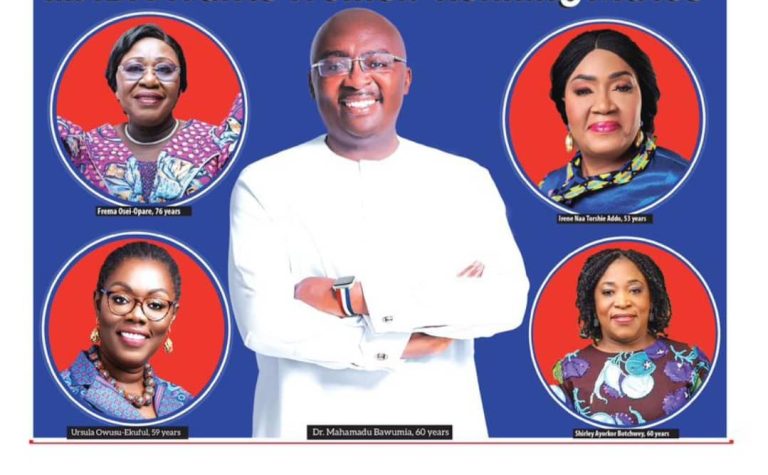The International Federation of Women Lawyers (FIDA-Ghana), has indicted the New Patriotic Party (NPP) of trailing behind in the selection of women as running mates to partner presidential candidates.
The group said “it is a shame that after 66 years of independence, Ghana has had no woman vice president” and has accordingly issued a statement that called on all political parties contesting the 2024 general elections in Ghana to ensure that women are elected as running mates, because a female vice president is long overdue in the country
FIDA-Ghana noted in the statement: “Ghana has organised seven successful elections since 1992. However, women’s share of parliamentarians in all these elections has always been below the African average of 21 per cent and far less than the UN-recommended 40 per cent minimum threshold. Even in the District Level Elections, Data from the Alliance for Women in the Media stated that females elected as Assembly Members are less than five per cent.
READ ALSO: Flashback: Watch how Bawumia bought waakye from popular waakye seller Auntie Muni with QR Code
Fortunately, the “so-called” smaller parties such as the Progressive People’s Party (PPP) which selected two women, the late Eva Lokko, in 2012 and Ms Bridget Dzogbenuku in 2016, as running mates, have been models of more inclusiveness in the selection of running mates.
The Convention People’s Party (CPP) also elected Nana Akosua Frimpomaa Sarpong II as its running mate in 2012.
FIDA-Ghana is not suggesting that women should always be relegated to running mates. However, it is important to start this inclusive process because the ultimate is to see a female presidential nominee of a political party voted as president, as witnessed in other countries such as Tanzania and Ethiopia.
The selection process of female candidates is through the political parties and until recently, the National Democratic Congress (NDC), in 2020, also elected its first female running mate, Professor Naana Jane Opoku Agyeman. This leaves the incumbent New Patriotic Party (NPP) trailing as it has yet to elect a female running mate.
READ ALSO: NPP’s Running Mate Revelation: Akomea Unveils Timeline Amid Speculation
Interestingly, the NPP is yet to announce who would partner Vice President Mahamadu Bawumia for the December 2024 presidential elections.
The names of notable female bigwigs within the party has come up strongly in political grapevine conversations and sometimes even in traditional media reports though none of them has personally confirmed or denied interest in the running mate slot.
The names of females within the NPP that have popped up in the running-mate-selection talks includes the Chief of Staff at the Presidency, Akosua Frema Osei-Opare who turns 77 in June this year. Frema is a former Member of Parliament (MP) for the Ayawaso West Wuogon Constituency.
53-year old lawyer, Irene Naa Torshie Addo-Lartey currently the Administrator of the District Assemblies Common Fund, has also been mentioned as an ideal running mate for Dr. Bawumia, an economist. Irene was a Deputy Minister for Foreign Affairs and former MP for Tema West.
Another female lawyer, Ursula Owusu-Ekuful, 59 years currently the Minister for Communications and the Member of Parliament for Ablekuman West has also been tipped as a possible running mate.
Also mentioned is the current Minister for Foreign Affairs, Shirley Ayorkor Botchwey, 60 years. She is a former MP for the Weija Constituency.
READ ALSO: Dr. Bawumia not bound to choose running mate from Ashanti Region – Kwesi Botchway Jnr
The statement by FIDA noted further: “Any political party that shows little inclination to nominate running mates as women and support their female candidates sends signals that they have a male-oriented party culture which is undemocratic and exclusive, favouring male participation.
“Such a culture ignores women’s rights to fully participate in politics. Additionally, any culture that asks female candidates to step down for more “successful” male candidates perceived by the leadership of political parties as a “safe” candidate over the female candidate clearly contravenes the Sustainable Development Goal (SDG) Five, which calls for gender equality.
“The SDG Goal Five further states that women’s equality and empowerment is one of the 17 sustainable goals, which is also integral to all dimensions of inclusive and sustainable development. Gender parity in politics is, therefore, essential to the progressive development of all women and girls.
“As Ghana prepares for its ninth election, FIDA advocates that all political parties should consider the selection of women as their running mates. This will ensure that at least whichever political party wins the elections, its vice president will be a woman.
“The Affirmative Action (AA) bill is one of the most compelling legislation to promote women’s participation in politics and public life and could have facilitated a strong advocacy campaign persuading political parties to adopt measures to remove obstacles to the full participation of women in both the party machinery and the contest for elections. In the absence of this bill, Ghana is a signatory to countless international conventions, including the Convention on Elimination of all forms of Discrimination Against Women (CEDAW), the Maputo Protocol, the African Charter on Human and People’s Rights on the Rights of Women in Africa.”

